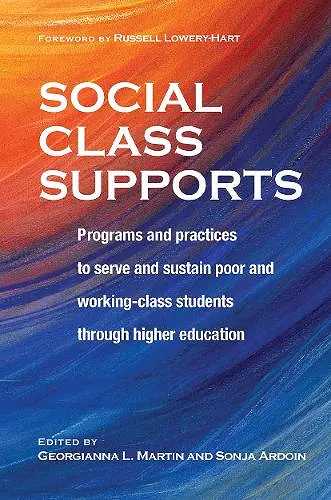Social Class Supports
Programs and Practices to Serve and Sustain Poor and Working-Class Students through Higher Education
Sonja Ardoin editor Georgianna Martin editor
Format:Paperback
Publisher:Taylor & Francis Inc
Published:28th Jul '21
Currently unavailable, and unfortunately no date known when it will be back
This paperback is available in another edition too:
- Hardback£145.00(9781642671209)

Historically, higher education was designed for a narrow pool of privileged students. Despite national, state and institutional policies developed over time to improve access, higher education has only lately begun to address how its unexamined assumptions, practices and climate create barriers for poor and working class populations and lead to significant disparities in degree completion across social classes.The data shows that higher education substantially fails to provide poor and working class students with the necessary support to achieve the social mobility and success comparable to the attainments of their middle and upper class peers. This book presents a comprehensive range of strategies that provide the fundamental supports that poor and working-class students need to succeed while at the same time dismantling the inequitable barriers that make college difficult to navigate.Drawing on the concept of the student-ready college, and on emerging research and practices that colleges and universities can use to explore campus-specific social class issues and identify barriers, this book provides examples of support programs and services across the field of higher education – at both two- and four-year, public and private institutions – that cover:·Access supports. Examples and recommendations for how institutions can assist students as they make decisions about applications and admission.·Basic needs supports. Covering housing and food security, necessary clothing, sense of belonging through co-curricular engagement, and mental health resources.·Academic and learning supports. Describes courses and academic programs to promote full engagement among poor and working class students.·Advising supports. Illustrates advising that acknowledges poor and working class students’ identities, and recommends continued training for both staff and faculty advisors.·Supports for specific populations at the intersection of social class with other identities, such as Students of Color, foster youth, LGBTQ, and doctoral students.·Gaining support through external partnerships with social services, business entities, and fundraising.This book is addressed to administrators, educators and student affairs personnel, urging them to make the institutional commitment to enhance the college experience for poor and working class students who not only represent a substantial proportion of college students today, but constitute a significant future demographic.
From the Foreword:
"Education and poverty are tied together in a nightmare of policy failures, bureaucratic culture, stereotypes those trapped by poverty, and professional inaction. Fortunately, this important and timely work from Georgianna Martin and Sonja Ardoin help us unpack the link between education and poverty. In doing so, the reports from and about social justice warriors provide the roadmap for higher education to change itself and then change our country.
I was inspired by the efforts captured within this book. You will be challenged by these examples of innovation, realization, and actualization. The editors effectively segment examples how higher education institutions see, hear, and support a class of students higher education usually ignores. I was moved by each chapter and initiatives showcased. I saw my own institutional transformation at Amarillo College located within the groundbreaking work you will read.
I know how powerful it can be when you see your students for who they really are and commit your entire institution to their success. I witnessed the transformation of knowing your student, loving her, and building yourself for her. At Amarillo College, we named our typical student Maria. She is woven into each page of each chapter of this incredible publication. I want you to meet and know her, because she will challenge you to rethink your own work in the context of the Social Class Supports: Programs and Practices to serve and sustain poor and working class students through higher education."
Russell Lowery-Hart, president
Amarillo College
“Utilizing the expertise of students, practitioners, scholars, and faculty, the editors have curated a robust compendium of resources to support poor and working-class college students in higher education. This volume should be read by anyone seeking to center the experiences of marginalized students on their campuses; validate poor and working-class students' strengths, assets, and struggles; disrupt the stratified system of higher education; and dismantle axiomatic cycles of social reproduction on the eternal journey toward social justice, equity, and inclusion.”
Krista Soria
Director of Student Affairs Assessment, University of Minnesota
"Martin and Ardoin have created a masterful resource that provides scholars, administrators in higher education, ans students a way to transform colleges and universities. This book represents an important advancement in conceptualizing social class and classism as a critical aspect in our intersectional approaches to create and sustain healthy living and learning environments."
William Ming Liu
Professor and Chair; Department of Counseling, Higher Education, and Special Education; College of Education, University of Maryland
"[This] is the book we all need right now! Martin and Ardoin have pulled together an exceptional group of professionals who share powerful stories, do meaningful work, and offer practical strategies to support poor and working-class students in higher education."
Jackie Thomas Jr.
Chief Strategist, Lone Star College-Tomball
"This long-overdue work offers proven strategies and keen analysis that will assist practitioners and decision-makers as they seek to increase access, remove barriers, and change mindsets to support poor and working-class students as they navigate institutions that were not built with them in mind."
Jeremiah Shinn
Vice President for Student Affairs, Louisiana State University
ISBN: 9781642671216
Dimensions: unknown
Weight: 594g
432 pages